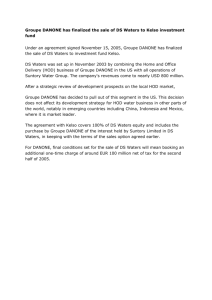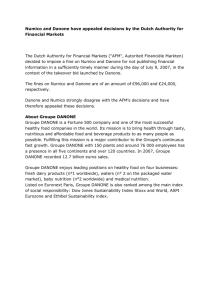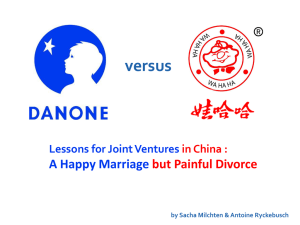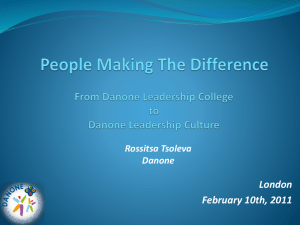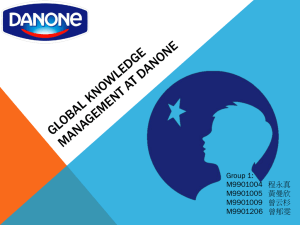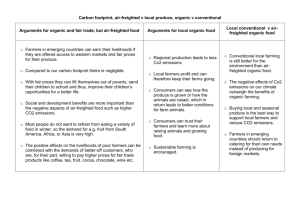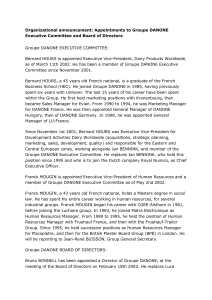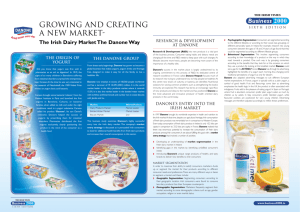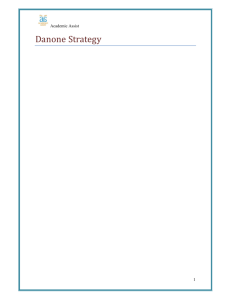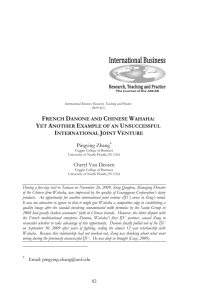Providing Clarity on Oxfam Declaration about Danone Climate Policy
advertisement
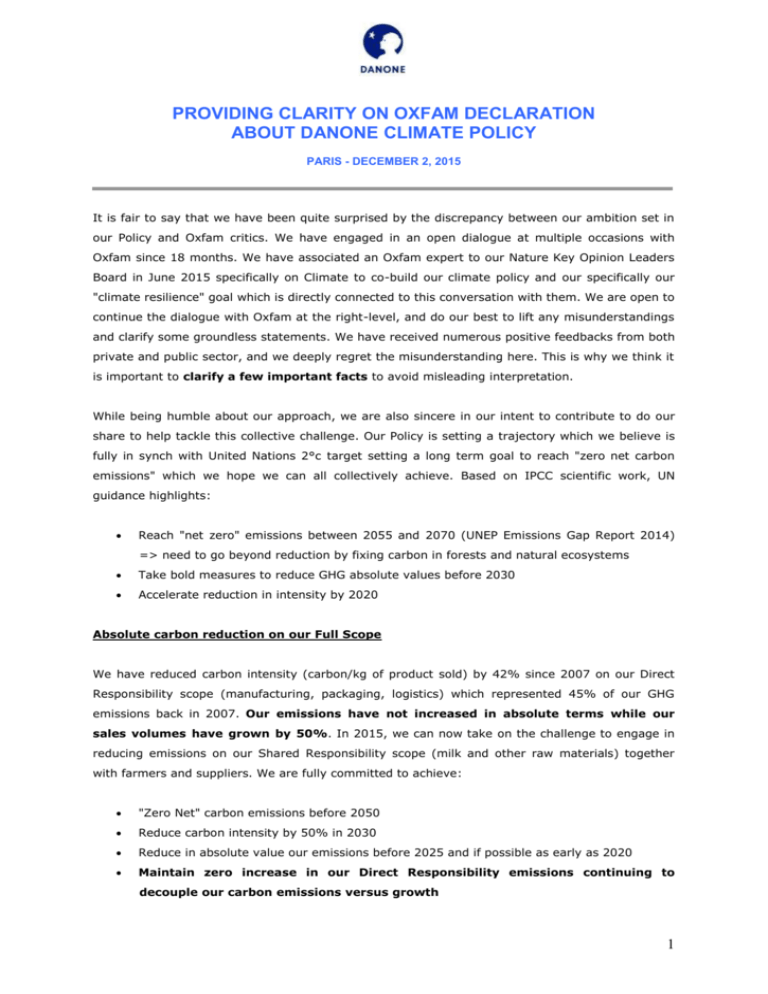
PROVIDING CLARITY ON OXFAM DECLARATION ABOUT DANONE CLIMATE POLICY PARIS - DECEMBER 2, 2015 It is fair to say that we have been quite surprised by the discrepancy between our ambition set in our Policy and Oxfam critics. We have engaged in an open dialogue at multiple occasions with Oxfam since 18 months. We have associated an Oxfam expert to our Nature Key Opinion Leaders Board in June 2015 specifically on Climate to co-build our climate policy and our specifically our "climate resilience" goal which is directly connected to this conversation with them. We are open to continue the dialogue with Oxfam at the right-level, and do our best to lift any misunderstandings and clarify some groundless statements. We have received numerous positive feedbacks from both private and public sector, and we deeply regret the misunderstanding here. This is why we think it is important to clarify a few important facts to avoid misleading interpretation. While being humble about our approach, we are also sincere in our intent to contribute to do our share to help tackle this collective challenge. Our Policy is setting a trajectory which we believe is fully in synch with United Nations 2°c target setting a long term goal to reach "zero net carbon emissions" which we hope we can all collectively achieve. Based on IPCC scientific work, UN guidance highlights: Reach "net zero" emissions between 2055 and 2070 (UNEP Emissions Gap Report 2014) => need to go beyond reduction by fixing carbon in forests and natural ecosystems Take bold measures to reduce GHG absolute values before 2030 Accelerate reduction in intensity by 2020 Absolute carbon reduction on our Full Scope We have reduced carbon intensity (carbon/kg of product sold) by 42% since 2007 on our Direct Responsibility scope (manufacturing, packaging, logistics) which represented 45% of our GHG emissions back in 2007. Our emissions have not increased in absolute terms while our sales volumes have grown by 50%. In 2015, we can now take on the challenge to engage in reducing emissions on our Shared Responsibility scope (milk and other raw materials) together with farmers and suppliers. We are fully committed to achieve: "Zero Net" carbon emissions before 2050 Reduce carbon intensity by 50% in 2030 Reduce in absolute value our emissions before 2025 and if possible as early as 2020 Maintain zero increase in our Direct Responsibility emissions continuing to decouple our carbon emissions versus growth 1 Pioneer and accelerate "carbon positive" programs to fix carbon in natural ecosystems (mangroves, forests, soils and agriculture...) according to methodologies recognized by UN We have already been implementing concrete projects to reduce both our Shared and Direct scope carbon intensity each year which should help us cut our absolute full scope emissions consistent with UN trajectory. We have also committed to keep track with state-of-the-art scientific developments and methods that capture upstream agriculture carbon emissions (not available yet), to adjust our mitigation targets and plans. This is why, on November 9, Danone joined the Science Based Targets initiative to help us set our absolute value target on our full scope in the 2020-2025 period. Taking on the Scope 3 challenge is a massive step change and will require: building alliances and co-create solutions with farming communities and suppliers implementing Danone’s Sustainable Agriculture principles to help transform dairy farming via more resource-efficient practices building the circular economy on strategic resources (milk, packaging and water) preventing food-waste and maximizing its recovery. Fixing carbon in natural ecosystems Danone is a signatory of UN New York Declaration on Forests in 2014. Restoring natural ecosystems is critical to fight against climate change and at the same time help rural communities adapt to the changing climate. We have long been one of the pioneers in this space and contributed to promote and spread the solutions we tested in many parts of the world. For example, Danone initiated in 2011 the Livelihoods Carbon Fund, an initiative concretely supporting rural communities protect their ecosystem and plant trees. Danone initiated in 2015 another platform, the Livelihoods Fund for Family Farming. This initiative will work with over 200,000 smallholder farmers in the next ten years, investing 100m€. With these and other initiatives, Danone supports and invests in projects that are connected to its agricultural supply-chain with explicit goal to reduce carbon footprint, improve smallholder farmers’ lives and contribute to a better environment clarifying Oxfam shortcut statement that those “projects should have the needs of the small-scale producers at their core, instead of serving as a carbon sink”. Contrary to Oxfam statement, we do not plan to purchase carbon credits “off-the-shelf” on the market. What we do is invest in concrete projects with local communities, civil society and other companies. These projects sequester carbon, reduce C02 emissions and generate both social and environmental positive impacts, for the benefit of society at large and local farmers’ livelihoods. 2 Resilience & farmers Smallholder farmers are at the heart of Danone’s approach to sustainable agriculture. Worldwide, Danone’s Fresh Dairy Products Division collects 7.5 billion liters of milk a year from over 140,000 milk producers in almost 40 different countries. 80% of our producers have fewer than ten cows. As stated in Danone Sustainable Agriculture White Paper published in 2014, we are committed to: Encourage business models that provide producers with an income that is both fair and sustainable, and enables farmers to take care of their families and grow their businesses. Work with farmers to raise governments’ and other institutions’ awareness of how hard it can be for farmers to secure access to the resources they need, including land, credit and training. Promote working conditions on and around farms that comply with prevailing law and fundamental social principles, and preserve the well-being and health of farmers and farm workers, especially women. Encourage producers to form organizations that can improve conditions for raising crops and livestock, ensure product quality, create value, promote sharing of best practices. Promote cooperation with technical institutes, universities and other stakeholders to help develop and disseminate new knowledge and agricultural practices. In our Climate Policy, Danone is also seeking to: Co-build climate resilience with smallholders, recognizing farmers capability to improve their livelihoods is the number one drive for climate adaptation, with a holistic view of economic resilience embedded in our sustainable agriculture approach Maintain diversity of agriculture systems Provide modern extension services to farmers important for adaptation Protect diversity of genetic resources We have started piloting the implementation of Sustainable Agriculture practices in several parts of the world through for example developing a innovative contract frameworks with farmers securing to cover feedstock costs, helping manage price volatility while securing a fair level of margin. This new frame will allow to be more mature in the relationship, facilitating transformation towards sustainable farming practices and stimulating joint carbon reduction approaches. Danone actively contribute to collective carbon reduction and climate change adaptation programs with its peers and dairy producers associations. For example, the Life Carbon Dairy plan driven by the French Dairy Association or the Dairy Sustainable Framework program developed by the International Dairy Federation. We also have implemented over the past five years 29 Danone Ecosystem’s funds projects co-created with local NGOs in 21 countries. Examples include Terragreau project in France or the “H’lib Bladi” project in Morocco. These pilots help Danone build climate-smart agriculture models which can then be replicated in other countries deployed on a larger scale. 3 Deforestation Danone was ranked for the second year in a row among best companies (5/5) by Forest 500 (Global Canopy Program) As planned, we have provided in December 2015 a fully transparent update on Palm Oil supply-chain risks assessment and action plans work with The Forest Trust (available on www.danone.com) We joined the Palm Oil Innovation Group taking leadership in sustainable palm oil production together with leading NGOs on this issue Call for an ambitious agreement in Paris COP21 Danone fully supports publically the need for an ambitious agreement in Paris. Danone signed the Caring-for-Climate public statement, the Paris Pledge for Action and the French Business Climate Pledge all asking for an ambitious agreement to be found in Paris. 4

